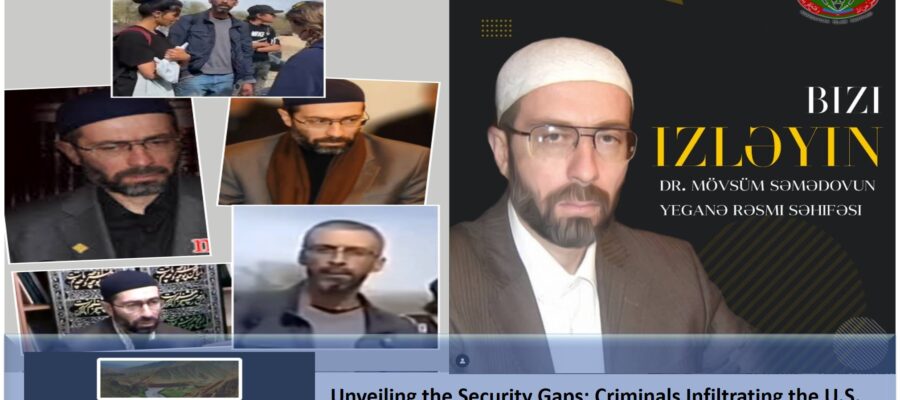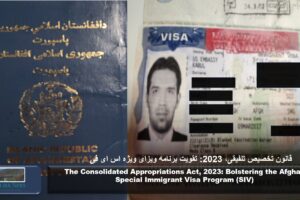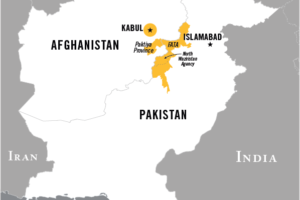Mavsun Samadov, born on September 4, 1965, in the Guba district to Mardan and Mehpare Samadov, has recently found himself at the center of attention due to a journey that led him to attempt to cross the border into the United States. The encounter with an American journalist during this journey has sparked curiosity and raised questions about Samadov’s identity and intentions.
In January 2024, Mavsun Samadov faced an American journalist who posed questions regarding his attempt to enter the United States. Samadov, however, responded with an air of defiance and intrigue, stating, “You’re smart enough will know who I am?”- But “You’re not smart enough will know who I am?”- “Soon you will know Who I am?”
This cryptic response left the journalist and the public wondering about the true nature of Samadov’s identity.
According to official sources, including NATO and the United States Commission on International Religious Freedom, Mavsun Samadov is alleged to have been involved in serious criminal activities. The accusations include arms trafficking, illicit use of weapons, criminal premeditation, conspiracy, terrorism, treason, sedition, and unlawful disobedience. These charges paint a troubling picture of Samadov’s alleged involvement in activities that threaten international peace and security.
Investigations conducted by Kauser News Agency revealed a startling revelation about Mavsun Samadov’s connections with the Iranian government. On his various social media accounts, Samadov is portrayed as one of the best allies of the Iranian government. The news agency has reported that Samadov has been actively threatening the United States of America, raising concerns about potential geopolitical implications.
His posts and videos on Instagram, Facebook, and YouTube are against the United States Government and NATO allies.

A look into Mavsun Samadov’s Wikipedia account provides additional insights into his background and alleged activities. While the article does not delve into the specifics of the accusations, it acknowledges the controversies surrounding Samadov and hints at the gravity of the situation. “In 1972-1982, he completed his secondary education at Guba city secondary school No. 3, and in 1983-1989, he received higher medical education at the Department of Treatment and Prevention of the Nariman Narimanov Azerbaijan Medical Institute (now Azerbaijan Medical University).”
“In 1989-1990, he completed an internship and received the “therapist” qualification.”
“In 1990-1992, he completed full-term active military service. He was discharged from the ranks of the Armed Forces with the military rank of “medical service lieutenant”. Currently, he is a reserve medical service lieutenant of the Azerbaijan Armed Forces. After his military service, he worked as a doctor in the Republic of Dagestan of the Russian Federation, and then as a chief doctor for 2 years at the Digah village outpatient clinic in the Guba region.”
“In 1995-2002, he received religious education at the Qom Scientific Center located in the city of Qom , Iran .”
“His wife Mehpara Samadova participated in the international conference on “Islamic Awakening and Women” held on July 11, 2012, under the chairmanship of Iran’s Supreme Leader Ali Khamenei and read a poem dedicated to Khamenei by their daughter Zahra Samadova in Persian”
On July 1, 2013, the General Assembly of the Islamic Party of Azerbaijan adopted a decision on the nomination of the chairman of the party, M. Samadov, for the presidency and on that day he was imprisoned in Penitentiary No. 11 for several days “kars” has been established. His lawyer, Anar Gasimli, stated that the prison did not provide information about why and for how many days M. Samadov was put under “kars”.
“On August 19, 2013, M. Samadov applied to the Central Election Commission of the Republic of Azerbaijan to register his candidacy for the presidency with the application written by Akif Heydarli , the deputy chairman of AIP and the head of the “Movement for Moral Elections and Fair Government” initiative group.
The CEC stated that there was no appeal to the CEC about the nomination of M. Samadov. In connection with this issue, M. Samadov announced that he boycotted the presidential elections and did not participate in the elections.
On January 24, 2011, a meeting of the General Assembly of the Islamic Party of Azerbaijan was held, and according to the party’s charter, the chairmanship of Movsum Samadov, who was in prison, was given to his first deputy, Elchin Manafov.
By the decision of Baku Serious Crimes Court dated October 7, 2011, M. Samadov was sentenced to 12 years in prison according to the charges against him.
M. Samadov was sent to Baku City Penitentiary No. 11 after the court verdict. It has been “kars” several times here. On September 18, 2014, he was sent to Baku City Penitentiary No. 12 without any reason. Here, he was put on “kars” for 5 and then 7 days. On October 9, 2014, the Garadagh District Court issued a decision to transfer M. Samadov to Gobustan closed prison for a period of 2 years, based on the claim of the head of prison No. 11 of Baku city. An appeal was filed against the decision of the Garadagh court by his lawyer A. Gasimli . Based on the appeal, the court held on November 24, 2014 upheld that decision.
On December 12, 2019, the European Court of Human Rights announced its decision regarding Movsum Samadov’s complaint. In the decision, the violation of M. Samadov’s rights was recognized and Azerbaijan should pay him 4,000 euros in compensation . According to the court’s decision, the arrest of M. Samadov was accompanied by the violation of some rights guaranteed by the European Convention on Human Rights . We are talking about the rights guaranteed by Articles 5.3 (unlawfulness of detention) and 6.1 (failure to ensure a fair trial) of that Convention.
Since 2021, Kauser News Agency, with the support of Field Counterintelligence (CI) operatives from Afghanistan, has been tirelessly researching the potential threat of criminals from Afghanistan, Pakistan, Iran, and the Middle East finding their way into the United States. Despite numerous meetings and conversations with federal authorities, the response has been far from reassuring, with officials citing a lack of knowledge or the need for additional documentation to confirm the reports.
The situation gained urgency following the fall of the Afghanistan government and the subsequent evacuation operations. Brazil and several South American countries, in a humanitarian gesture, opened their doors to welcome immigrants.
Amidst the chaos, concerns have emerged regarding the screening process and the potential entry of individuals with malicious intent.
Reports from the Department of Defense (DoD) and federal agencies have revealed that during evacuation operations, three members of Al-Qaeda managed to infiltrate the United States. This revelation underscores the need for a robust and foolproof screening process to prevent the entry of individuals with ties to terrorism.”
Kauser News Agency’s Counterintelligence sources in Kabul have confirmed that in 2022, more than 85% of Afghan citizens and foreign nationals who were previously incarcerated in Kabul and Afghanistan Provincial Jails have successfully relocated to European countries, the UK, Canada, the United States, and various South American countries. What raises significant concerns is the fact that many of these individuals were charged with terrorism or murder.
The troubling question that arises is why the Department of Defense Counter Intelligence, equipped with fingerprint and biometric technology, failed to recognize these individuals with criminal backgrounds during the evacuation process. The apparent lapse in security measures raises serious doubts about the effectiveness of the screening procedures in place.
As the world continues to grapple with the aftermath of the Afghanistan crisis, the United States and its allies must reevaluate and strengthen their security protocols. The infiltration of individuals with ties to terrorist organizations poses a direct threat to the safety and security of the nation. Federal authorities must address these lapses, cooperate with intelligence agencies, and implement more stringent measures to ensure the thorough vetting of individuals entering the country.
The findings of Kauser News Agency’s research, coupled with alarming reports from federal agencies, highlight the urgent need for a comprehensive review of evacuation and immigration processes. The safety of the United States and its citizens depends on the ability to identify and prevent the entry of individuals with nefarious intentions. It is time for a collaborative and proactive approach to enhance national security in the face of evolving global challenges.





